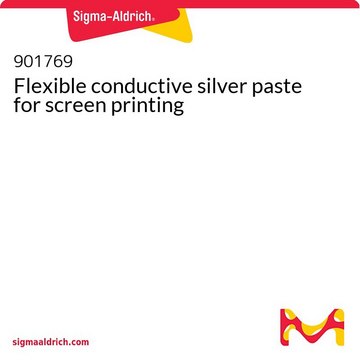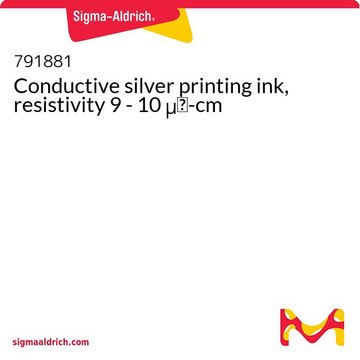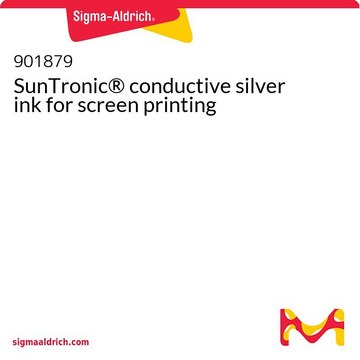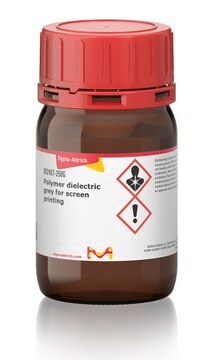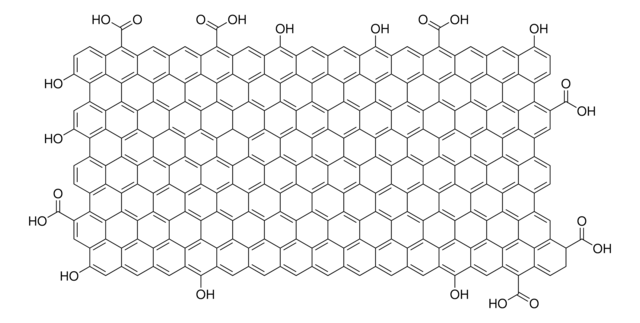901773
Silver/silver chloride (60/40) paste for screen printing
Synonym(s):
Ag/AgCl paste, C2130809D5, conductive ink
About This Item
Recommended Products
description
Coverage: 200 cm2 per g (using a 156 mesh polyester screen)
Sheet resistivity:<100 miliohms per square (20 micron thick printed on alumina substrate)
form
paste
viscosity
2.0-5.5 Pa.s (Haake RS1 C20/2° TiL at 230 sec-1 at 25°C)
General description
Application
- Highly sensitive determination of heavy metals in water prior to and after remediation using Citrofortunella Microcarpa: This study utilizes Silver-silver chloride (Ag/AgCl) Paste (60:40) in screen printing electrodes for environmental monitoring applications (Palisoc et al., 2021).
- Screen-printed graphite electrodes as low-cost devices for oxygen gas detection in room-temperature ionic liquids: This research incorporates a silver/silver chloride reference electrode by screen-printing Ag/AgCl paste (60:40) onto a flexible film, exploring its effectiveness in gas sensing technologies (Lee et al., 2017).
- Simple Portable Voltammetric Sensor Using Anodized Screen-Printed Graphene Electrode for the Quantitative Analysis of p-Hydroxybenzoic Acid in Cosmetics: In this study, silver/silver chloride paste (Ag/AgCl: 60/40) was used to enhance the functionality of screen-printed electrodes for cosmetic analysis (Charoenkitamorn et al., 2022).
- Dipstick Sensor Based on Molecularly Imprinted Polymer-Coated Screen-Printed Electrodes for Single-Shot Detection of Glucose in Urine Samples: This research features the use of silver/silver chloride (60:40) reference electrode, screen-printed onto plastic for biomedical applications (Caldara et al., 2023).
- Simultaneous determination of ascorbic acid, dopamine, and uric acid using graphene quantum dots/ionic liquid modified screen-printed carbon electrode: Utilizes carbon ink and silver/silver chloride (Ag/AgCl) paste 60/40 for developing advanced sensor platforms (Kunpatee et al., 2020).
Features and Benefits
- Applications in medical diagnostics, environmental sensors
- High conductivity
- Low curing temperature
Preparation Note
- Screen Printing Equipment: semi-automatic, manual
- Ink Screen Life: >3 hours
- Screen Types: polyester, mesh 156 to 230 tpi
Note: Stainless Steel mesh is not recommended, since a paste component can become corrosive in the presence of moisture.Also, plastic palette knives should be used instead of metal knives.
- Typical Drying Conditions: Dry at 60°C for 30minutes or 80°C for 10minutes in a box oven.
- Clean up solvent: ethoxyl propanol or seriocol
- Substrate: polyester, PVC, polycarbonate and alumina
Legal Information
signalword
Warning
hcodes
Hazard Classifications
Aquatic Acute 1 - Aquatic Chronic 1 - Met. Corr. 1
Storage Class
8A - Combustible corrosive hazardous materials
wgk_germany
WGK 3
flash_point_f
192.2 °F
flash_point_c
89 °C
Choose from one of the most recent versions:
Already Own This Product?
Find documentation for the products that you have recently purchased in the Document Library.
Customers Also Viewed
Articles
Professor Tokito and Professor Takeda share their new materials, device architecture design principles, and performance optimization protocols for printed and solution-processed, low-cost, highly flexible, organic electronic devices.
Our team of scientists has experience in all areas of research including Life Science, Material Science, Chemical Synthesis, Chromatography, Analytical and many others.
Contact Technical Service